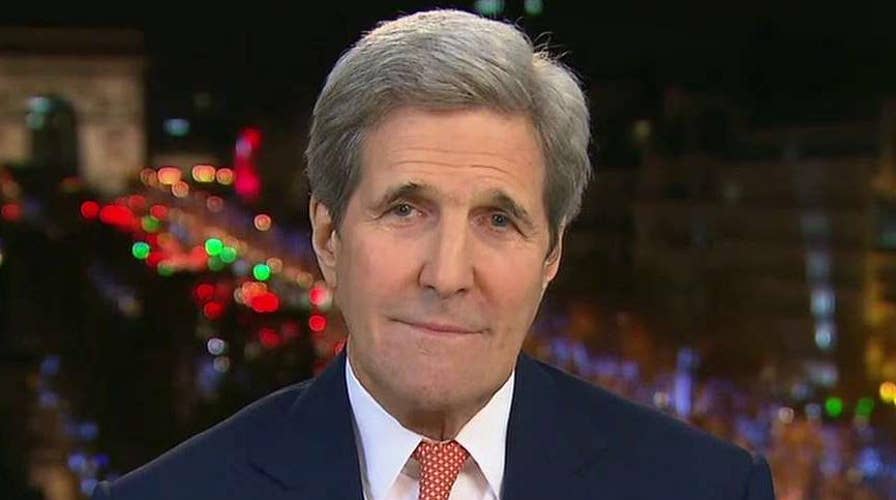Kerry: Climate deal lacks penalties because of US Congress
Secretary of State Kerry talks how countries will be held accountable for meeting goals
Secretary of State John Kerry on Sunday defended the global carbon-emissions deal reached this weekend amid criticism that it lacks enforcement and touted the pact as a jobs creator.
Kerry, who helped negotiate the deal with China and 185 other countries, told “Fox News Sunday” that enforcement mechanisms and sanctions were not possible because Congress and other nations would not have agreed to them.
“If there had been a penalty, we wouldn’t have gotten an agreement,” Kerry said from Paris, where the international deal was announced Saturday. “So it has to be voluntary. We got the best deal we could.”
He also said the mandatory reporting every five years “is a serious form of enforcement and compliance.” And, like President Obama, Kerry touted the deal as a jobs creator, contrary to critics who say the demand for lower carbon emissions will hurt the U.S. fossil fuel industry and other sectors of the economy.
“I think it actually sends a big powerful message to the marketplace,” Kerry said. “A lot of jobs are being created.”
He also suggested that Obama will do whatever possible to get the billions of dollars he needs for the deal, if Congress tries to withhold the money.
Obama on Saturday hailed the deal as a “turning point for the world” and lauded it as a jobs creator.
“Skeptics said these actions would kill jobs,” Obama said. “Instead, we’ve seen the longest streak of private-sector job creation in our history. … In short, this agreement will mean less of the carbon pollution that threatens our planet and more of the jobs and economic growth.”
The deal, known as “the Paris agreement,” is supposed to take effect in 2020 and attempts to limit global temperature rise even more -- to 1.5 degrees Celsius.
Senate Majority Leader Mitch McConnell, R-Ky., called the deal’s objectives “unattainable” and slammed Obama’s claims about what it would achieve.
“The president is making promises he can’t keep, writing checks he can’t cash, and stepping over the middle class to take credit for an ‘agreement’ that is subject to being shredded in 13 months,” he said.
In the deal, the countries pledge to limit the amount of greenhouse gases emitted by human activity to the same levels that trees, soil and oceans can absorb naturally, beginning at some point between 2050 and 2100.
The deal now needs to be ratified by individual governments before taking effect. At least 55 countries account for roughly 55 percent of global emissions.





